#claws out for robespierre
Text
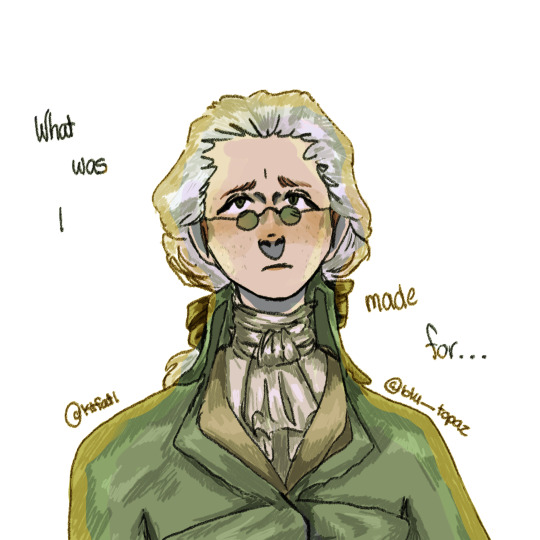
“What was I made for…
Cause I, I..
I dont know how to feel,
But I wanna try… “
This song reminds me of Robespierre.
#yes I know I said I didnt like the Barbie movie and thats still true#but I adore this song#I also love Robespierre.#frev#french revolution#claws out for the main 5#maximilien robespierre#robespierre#robespierre protection squad#claws out for robespierre#ktfatl draws#frev art#frav fanart
94 notes
·
View notes
Text
I'm having a moment and you all must witness it.
Maximilien Robespierre liked to dance and I've decided he was good at it.
Listen my man couldn't sing, didn't play an instrument and was rumored to have been nervous around horses. He deserves to have been good at dancing.
But also can I say how attractive that thought is to me. He was already so pretty and elegant and imagining him gently pressing his palm to some lady and doing those little prances or twirling is compelling to me. Like what a little romantic figure.
So Robespierre = Good dancer.
#claws out for the main 5#Maximilien Robespierre#history peeps#absolute uncited nonsense#and i do not care
2 notes
·
View notes
Text
"not all men" you're right,Maximillien Robespierre would never treat me like this
173 notes
·
View notes
Photo
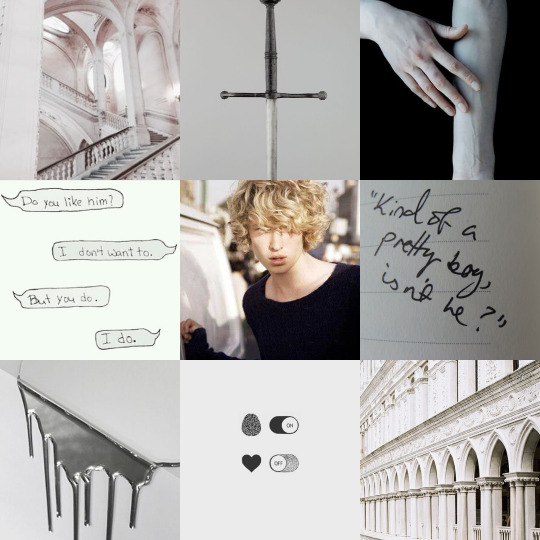
NANO UPDATE: MARBLE LAVINIA ROBESPIERRE
word count: 33,841 words of poor pacing and weird conversations
(ONE OF) MY FAVORITE SIDE CHARACTER(S) IS HERE CAN I GET A HELL YEAH
marble grew up in a magical cult, except that backfired because now he’s a gay anarchocommunist. excerpt under the cut!
The ground around them is spattered with puddles of liquid darkness; the walls are smeared with it. And above it all, white hair shining, ice-blue stare cutting into Caelum’s chest, six-inch claws fully extended, is the stranger in the trench coat.
Somewhere, in the dim corners of his exhausted mind, Caelum registers that he can’t be much older than he and Dawn. A college student, for sure. That should be comforting. Somehow the claws ruin the effect.
And his eyes. God. His eyes. Caelum’s never seen more beautiful eyes. And they’re twisted with hatred.
“Caelum,” Dawn gasps again. The stranger’s voice cuts through hers like a blade.
“My name is Marble Lavinia Robespierre, Builder of Kingdoms, Speaker of Truths, and Scourge of Corruption. I am the heir to the Sixth Family.” His gaze steals Caelum’s breath. “And you’re Caelum Finch.”
A slight gasp from Dawn. Then she collapses.
Caelum cries out. He reaches for her, almost falling over her, and - God. God. Her pulse is pounding in her wrists. Thank God. She’s okay, she’s alive, it’s just the use of her powers, that’s all. She’s alive.
But not, Caelum realizes, for long.
He looks up.
Maybe it’s the flickering fluorescent lighting haloing Marble Lavinia Robespierre’s head. Or maybe he just looks angelic. Full lips, Grecian nose, cheeks tinted silver, with the white-blond curls of an ancient statue. Six feet tall, maybe; it feels like six stories. In the trench coat, in the combat boots, with the claws, he’s a modern avenging angel. A modern executioner.
The first tears slide down Caelum’s cheeks.
tag list (let me know if you want to be added/removed!): @bluejaybabbles @yvesdot @ilfemi @luciellesgarden @thatchaoticneutraltrainwreck @deoxyribodyke @pen-for-sword @brightsoul19 @albatris @maxbeewriting @avi-burton-writing @hydigen @planets-and-prose
#max.txt#again! literally no pressure to interact if you're on the tag list! i understand it's nano we're busy + even if it wasn't!!! you are under..#.no obligation#marble lavinia robespierre#hell of a name. all the silverblood names are like that it's a Cult Thing#speaking of which.#ask to tag#quark tag#nano19#caelum finch#dawn andrews#max actually writes
19 notes
·
View notes
Text
( starter for @fataobstant ) set. 1787

SCHOOLBOY MELANCHOLY WAS A THING OF THE PAST, NOW. Camille supposed it had less to do with adulthood — a concept that had always seemed watery, effusive at its best — and more to do with the turn of times; the way they convoluted around the edges like manuscripts poorly bundled up. And he's never been one for the black bile, him. When it reached him, sadness did not come dispersed, broken down in its digestible parts. It came with the full force of everything gathering: a momentum that had bidden due time and now leaked into the world with a vengeance, as if he felt it for all the people who could not feel it, who could not will it into existence. It was then he wrote best, provided he did not cave to the first impulse to drink himself legless. Provided he waited long enough until that clear-cut anguish could thicken itself with rage. Instead, the sentiment that had seized him these last months, hurtling him over the floor from one room edge to another, from married women's salons, jewel quartiers, the barred-up offices of men of state ( also married, but less inclined to care ), gasping and proclaiming and tearing out jugulars, only to be sinking at the end into the most inconquerable silences of all — that sentiment was something else. It was blood-stopping active, none of sadness' pasivity in it. It was like finding yourself in the pointed, pearly claws of a cat.
When he wrote to Max, he wrote none of this. The letters stretched Greek and self-indulgent on the page, as if the more dead a tongue was, the more it repelled the truth. He talked about the Assembly of Notables and the off-kilter way clients prattled about the Estates, how they should or shouldn't be summoned, prattled right down the quai, backed against the nice chairs of the l'Ecole. He talked about the prices rising, sous going up with the subtle nudge of a woman's dress. He gave off a few warnings, too, and then some confessions to sweeten them, minor scandals, nothing more. Nothing that was truly real. Don't spend so much time grassed up in Arras or you'll forget what flagstones look like, you saint. Of course, the Greek formulation of that is sparse — he would say love, in the sarcastic way the saloniers do, he would say love and mean it as if he's addressing a martyr; he would say fool, you ought to be here with me. But none of those translate well on the other side of ancient. So he added Max at the end, hoping everything can fit within that shortened name, that needle tip. He balanced deprecation and humor and the steady, red thread that constituted his disgust with the world, that united their lives all the way from Louis le Grand to here, wherever this was. And then Robespierre was in Paris, before he could well figure out how to hide the holes in the parquet, the death wish peeking through, bruises he'd gathered from alleys no one bothered naming, police mandates written across the soft vowels of his name. Robespierre is in Paris and the world feels evened out again. Not immovable, no ( that is not what he could be accused of, not even in their cruelest arguments; Max wants it toppling down as much as he does ) but steadier. Stable enough Camille can catch his breath.
There's no Greek plaster to lay over the chaos now, when all greetings were said and done. When they've clutched each other in the garden near the Law Courts, laughing up all the nonsense men usually do — Camille supposed, though he had no way to know — after they haven't seen in a while. When they finished inquiring about health - Max did, at least- and family both near and extended ( which Camille always found an insufferable habit to mention, but did so anyway, because it unnerved his friend to delightful extents, all those cousin marriages they were both supposed to have by now ). They have found themselves a seat in one of the more well reputed cafes, only a streets down from the l'Ecole and the Parnasse, and Camille still hasn't said a word. He stares at Max, sparing a smile every now and then, twitches his head when the server brings their coffee. He bites on the inside of his cheek to hide—— he doesn't even know what. "So. Have I told you about my sit down with Mirabeau?"
#( camille. )#— ⋆ always bloody horizontal : interactions.#sorry this took so long dearie !! i was struggling to get it .. like .. halfway right?
1 note
·
View note
Photo

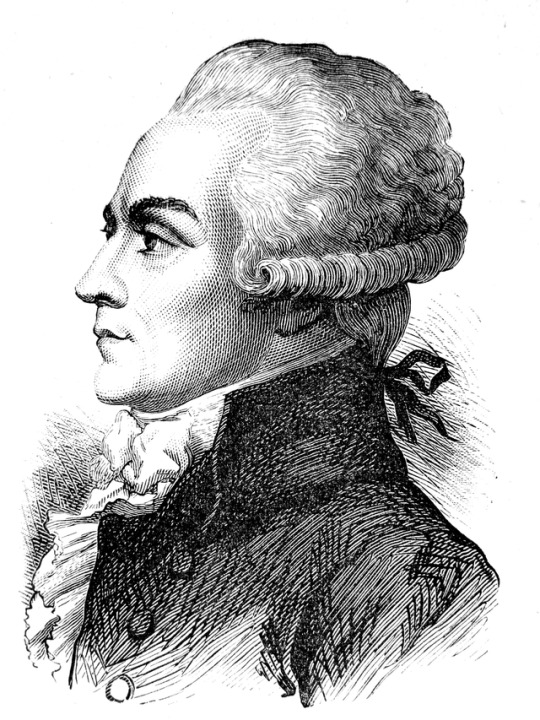
Fréron’s notes on Robespierre (1794)
Louis Marie Stanislas Fréron wrote these notes in the aftermath of the events of Thermidor; he addressed them to Courtois, who was in charge of the committee that examined the papers of Robespierre and his allies.
The picture that Fréron draws in his notes appears, in many respects, rather odd: he depicts Robespierre as a sad and anxious loner, an egotist who tyrannised both his friends and his enemies; furthermore, Fréron claims, among other things, that Robespierre was a drunkard who never left the house unarmed, which is extremely dubious, to say the least.
Robespierre was at the College of Louis-le-Grand, where he had for fellow students Camille Desmoulins, Lebrun, who since became minister, Sulleau, a journalist paid by the court, killed in 10 August at the head of a false patrol, Dupont du Tertre, minister of justice, and Fréron. He was what we have seen since; that is to say, sad, briskly, always daydreaming, and looking ill. [...] His face had already developed these convulsive grimaces for which he was known. Not communicative, without abandon, without effusions, without candour, but with an exclusive amour-propre, insurmountable stubbornness, a great stock of falsity. One cannot remember to have seen him laugh once. He remembered every slight; he was vindictive and treacherous, already knowing how to conceal his resentment.
His studies were good enough, and he won prizes at university. A strong and steady diligence in work earned him these first successes.
After having finished his law [studies], he embraced the profession of lawyer, which he exercised in his country (Arras). It seems that he barely devoted himself to defence speeches, and that he strove after the glory of the man of letters. Two speeches (which are printed), on very interesting matters, earned a prize and a honourable mention by two provincial academies. It would be curious to compare his first essays with his last speeches at the Convention and at the Jacobins.
Until the revolution, one no longer spoke of Robespierre; he made himself heard at the Assembly only with an extreme difficulty of speaking, although he often demanded the floor, mostly in evening sessions. One always forced him to remain silent, through boos and hubbub. The diffusion of words and the incoherence of ideas characterised his eloquence back then.
Everyone knows about his conduct and his writings during the Legislative Assembly and the Convention. This table belongs to history.
The most feeble cowardice directed all his actions in the days of danger. He did not show himself on 10 August.
On the day of the Champ de Mars Massacre, he came to the session of the Jacobins. There, the friends of liberty were assembled in very small number. The courtyard was soon filled with gunners and chasseurs des barrières, blind instruments of the furies of Lafayette and of his partisans. Robespierre trembled with fear when crossing this courtyard in order to make his way after the session, and, hearing these soldiers vomiting imprecations and threats against the Jacobins, [he] was obliged, in order to support himself, to take the hand of Lecointe [sic] de Versailles, in the uniform of a commander of the National Guard of Versailles, and of Lapoype, who has since become divisional general, then member of the society. He did not dare to go to sleep in the rue Saintonge in the Marais, where he stayed at the house of Humbert. He asked Lecointe if he knew, in the vicinity of the Tuileries, some patriot who could give him an asylum for the night. Lecointe suggested the house of Duplay to him, and led him there. From this day on, he did not leave it anymore. Maybe the development of his ambition has to be attributed to his change of domicile. As long as he had remained at the house of Humbert, he was accessible to his friends and to the patriots. Once [he moved into] Duplay's house, he became increasingly invisible. One locked him away from society, one adored him, one envied him, one lost him by elating his pride.
It is to be remarked that, from his arrival in Paris until the days of the Champ de Mars, he had been accommodated, fed, maintained, warmed [and] served at the house of Humbert. He never spoke to the latter about compensating him; he believed that [Humbert] was too honoured by having had a man so great as him for a dining companion. He never did him the slightest favour, and during the six last months of his life, he made him defend his door: the presence of a benefactor bothered him.
On the day that Lafayette came to the Jacobins with his entire general staff (after the king's flight), Robespierre did not speak, it was Danton who attacked Lafayette and brought him down.
Robespierre was choked with bile. His yellow eyes and complexion showed it. Also, at the Duplay's, one always had the kindness of serving, during the dessert (in all seasons of the year), a pyramid of oranges in front of him, which Robespierre ate avidly. He was insatiable; no one dared to touch this sacred fruit. No doubt, its acidity divided Robespierre's bilious humour and facilitated its circulation. It was easy to make out the place that Robespierre had occupied at the table, through the piles of orange peels that covered his plate. One noted that he loosened up as he ate them.
The use of the wine and the liquors that he drank immoderately undoubtedly made him commit some indiscretions. The fear of letting his secret slip made him renounce it, and during the last months of his life he only drank water.
He only walked [when being] armed with a pair of pistols, and his loyal bodyguards accompanied him everywhere; some of them spread in the streets that he had to pass, to aid him immediately in case of an attack.
Towards the end of his career, he practised [shooting with] a pistol in a garden every day. It is said that he had become skilled in this exercise. He did not have the courage to use this talent in order to kill himself.
At the time of the Legislative Assembly, during a dinner at the house of Duplay with several patriots, one discussed the armies and the generals. Robespierre said, with accent and while raising his eyes to heaven: My greatest regret is not having embraced the profession of arms upon leaving the Constituent Assembly, and not knowing the art of war. Back then, one did not pay attention to these words. His later conduct explained it.
The spiritual naiveties that slipped [from the lips] of Camille Desmoulins made [Robespierre] laugh until he cried. But it was a immoderate and convulsive laughter: then, he fell into his dark melancholy again.
When Charles Lameth was wounded in a duel, Robespierre made it his religious duty to pay him a visit twice per day. He called him his friend just as Barnave. He had the latter guillotined and would not have spared the other. He had pressed the hand of Camille, his childhood friend, on the same day that he signed his arrest warrant.
His face greatly resembled the one of a cat, and his handwriting seems to be scratched with a claw.
Source: Papiers inédits, tome I, p. 154ff.
116 notes
·
View notes
Text
Happy New Year, Here’s Every Movie I Watched In 2017!
Bold = First Viewing
Dracula (1958, dir. Terence Fisher)
Hot Fuzz (2007, dir. Edgar Wright)
Heavy Metal Parking Lot (1986, dir. John Heyn & Jeff Krulik)
Obvious Child (2014, dir. Gillian Robespierre)
Star Trek: The Motion Picture (1979, dir. Robert Wise)
Barbarella (1968, dir. Roger Vadim)
Kagemusha (1980, dir. Akira Kurosawa)
The Last Samurai (2003, dir. Edward Zwick)
Red Desert (1964, dir. Michelangelo Antonioni)
07/27/1978 (2017, dir. lasagnacat)
The Mind’s Eye: A Computer Animation Odyssey (1990, dir. Jan Nickman)
Godzilla Vs. Mechagodzilla II (1993, dir. Takao Okawara)
Captain America: Civil War (2016, dir. Anthony & Joe Russo)
The Secret Life of Pets (2016, dir. Chris Renaud & Yarrow Cheney)
Godzilla Vs. Spacegodzilla (1994, dir. Kensho Yamashita)
Zaat (1971, dir. Don Barton)
Legend of the Drunken Master (1994, dir. Lau Kar-leung & Jackie Chan)
Mike and Dave Need Wedding Dates (2016, dir. Jake Szymanski)
Ghidorah, the Three Headed Monster (1964, dir. Ishiro Honda)
Ikiru (1952, dir. Akira Kurosawa)
Get Out (2017, dir. Jordan Peele)
A Girl Walks Home Alone at Night (2014, dir. Ana Lily Amirpour)
Silent Running (1972, dir. Douglas Trumbull)
Heavy Metal Picnic (2010, dir. Jeff Krulik)
Heavy Metal Parking Lot (1986, dir. John Heyn & Jeff Krulik)
Deadpool (2016, dir. Tim Miller)
Keanu (2016, dir. Peter Atencio)
The Rocky Horror Picture Show (1975, dir. Jim Sharman)
Godzilla Vs. Destoroyah (1995, dir. Takao Okawara)
Doctor Strange (2016, dir. Scott Derrickson)
Independence Day (1996, dir. Roland Emmerich)
Creature From The Black Lagoon (1954, dir. Jack Arnold)
Star Trek Beyond (2016, dir. Justin Lin)
The Heat (2013, dir. Paul Feig)
The Exorcist (1973, dir. William Peter Blatty)
Godzilla (1998, dir. Roland Emmerich)
Day of the Dead (1985, dir. George Romero)
Ashik Kerib (1988, dir. Sergei Parajanov)
Eyes Without A Face (1959, dir. Georges Franju)
Monty Python and the Holy Grail (1975, dir. Terry Gilliam & Terry Jones)
Versus (2000, dir. Ryuhei Kitamura)
Godzilla 2000 (1999, dir. Takao Okawara)
Invasion of Astro-Monster (1965, dir. Ishiro Honda)
Stenka Razin (1908, dir. Vladimir Romashkov)
Queen of Spades (1910, dir. Pyotr Chardynin)
Airplane! (1980, dir. Jim Abrahams, David Zucker, & Jerry Zucker)
Star Trek II: The Wrath of Khan (1982, dir. Nicholas Meyer)
The Big Sick (2017, dir. Michael Showalter)
Godzilla Vs. Megaguirus (2000, dir. Masaaki Tezuka)
Steamboat Willie (1928, dir. Walt Disney & Ub Iwerks)
Stalker (1979, dir. Andrei Tarkovsky)
The Cabinet of Dr. Caligari (1920, dir. Robert Wiene)
The Wizard of Oz (1939, dir. Victor Fleming, King Vidor, George Cukor, and Norman Taurog)
Final Destination (2000, dir. James Wong)
Final Destination 2 (2003, dir. David Ellis)
Pocahontas II: Journey to a New World (1998, dir. Tom Ellery & Bradley Raymond)
Star Wars Episode IV: A New Hope, Special Edition w/ Red Letter Media Commentary Track (1977, dir. George Lucas)
Scream (1996, dir. Wes Craven)
Hellraiser (1987, dir. Clive Barker)
Logan (2017, dir. James Mangold)
The Rage: Carrie 2 (1999, dir. Katt Shea)
Francis Ford Coppola's Bram Stoker’s Dracula (1992, dir. Francis Ford Coppola)
Godzilla, Mothra and King Ghidorah: Giant Monsters All-Out Attack (2001, dir. Shusuke Kaneko)
Popstar: Never Stop Stopping (2016, dir. Akiva Schaffer & Jorma Taccone)
Cube (1997, dir. Vincenzo Natali)
Screwed (2000, dir. Scott Alexander & Larry Karaszewski)
The Ascent (1977, dir. Larisa Shepitko)
Landline (2017, dir. Gillian Robespierre)
Get Smart (2008, dir. Peter Segal)
Chemicals Like God (2017, dir. Matthew Roe & Kat Parker)
Pirates of the Caribbean: The Curse of the Black Pearl (2003, dir. Gore Verbinski)
Godzilla Against Mechagodzilla (2002, dir. Masaaki Tezuka)
Lady Bird (2017, dir. Greta Gerwig)
The Giant Claw (1957, dir. Fred F. Sears)
The Stranger (1946, dir. Orson Welles)
The Arrival of a Train at La Ciotat Station (1896, dir. Auguste Lumière & Louis Lumière)
Dragon Ball: Curse of the Blood Rubies (1986, dir. Daisuke Nishio)
Star Wars Episode I: The Phantom Menace w/ Rifftrax Commentary Track (1999, dir. George Lucas)
Primary (1960, dir. Robert Drew)
Too Funny to Fail: The Life & Death of The Dana Carvey Show (2017, dir. Josh Greenbaum)
12 Dates of Christmas (2011, dir. James Hayman)
Star Wars Episode VII: The Force Awakens (2015, dir. J.J. Abrams)
Adventures on the New Frontier (1961, dir. Richard Leacock, Albert Maysles, D.A. Pennebaker, & Kenneth Stilson)
A Christmas Prince (2017, dir. Alex Zamm)
Christmas Inheritance (2017, dir. Ernie Barbarash)
La Chambre (1972, dir. Chantal Akerman)
Hotel Monterey (1972, dir. Chantal Akerman)
Pearls of the Deep (1966, dir. Jiří Menzel, Jan Němec, Evald Schorm, Věra Chytilová, & Jaromil Jireš)
Catch Me If You Can (2002, dir. Steven Spielberg)
News From Home (1976, dir. Chantal Akerman)
Daisies (1966, dir. Věra Chytilová)
3 notes
·
View notes
Photo
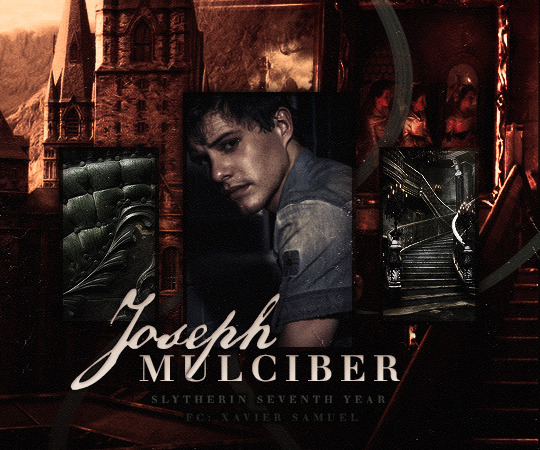
♔ HIS TEETH DRIP WITH CRIMSON; COME A LITTLE CLOSER ♔
✤ Joseph Mulciber.
✤ Slytherin / Seventh Year.
✤ Pureblood.
✤ Death Eaters.
✤ Open character.
Spite is your biggest motivator, it drives you and it guides you. It has since that filthy mudblood got your father thrown in Azkaban for showing them their rightful place, and it will until your last breath leaves your lungs. Your family was considered a disgrace in pureblood society when your father was put away, not because of what he did, but because he got caught, and you had to start off as an outsider. With tooth and nail, you clawed your way up, a dark mark now proudly gracing your forearm. You feel unbeatable.
BIOGRAPHY.
Power. Pleasure. Prominence. So was saying of House Mulciber. The french lineage was one that had blood stained hands, taking the lives of anyone that stood in their way. Friends, family, enemies, it was all the same to a Mulciber. The family came into being during the 18th century, teetering on the edge as observers for the longest time until opportunity came. Jacques Mulciber was a young wizard, no more than 25, when he saw a vision for his family. His father had died years earlier, leaving behind the family’s decisions to a child… and it was no surprise to see the Mulciber’s suffering. Jacques Mulciber was inexperienced as a leader, often walked over by the other pureblood families. Anger had been boiling underneath his calm exterior, his grand plan coming into fruition with every spiteful comment, every demeaning look. He would claw his way to the topic of the French society, he would prove everyone wrong.
It was no surprise to anyone that France was going through turbulent times. As the aristocracy grew in wealth, the poor barely scrounged enough for bread. The Wizarding World mirrored that of muggle. A storm was brewing and Jacques felt it. There was no better way to rise as family then to remove others… but Jacques struggled with how to do that successfully. On a trip to Paris, it was as if fate was smiling down on Jacques Mulciber. His carriage had struck another, and out tumbled a man. Someone whose picture had graced the French papers. Maximilien Robespierre, the face of the Revolution.
Jacques Mulciber knew that he wasn’t a good man. He was selfish, he did what he could to advance his own position. No matter who it would hurt. Jacques had little conscience telling him to leave the muggle man alone, but that simply wasn’t his way. Out came a charming facade, a friendly hand while he positioned a knife in the back of other pureblood families. Robespierre was a surprisingly easy man to control, especially with the help of the imperius curse. The Reign of Terror was an orchestrated event by a young Jacques Mulciber, Robespierre his marionette. It wasn’t a curiosity that the ends justify the means, and how the aristocracy were the main targets of france’s revenge. “Softness to traitors will destroy us all.” And such traitors were the other pureblood families that had laughed at the Mulcibers. As the guillotine fell, so did the people standing in his way. By the final chop in 1794, Jacques Mulciber commanded the french society. And he would be damned if his family ever fell from grace again.
Greatness continued down the Mulciber lineage until it fell into the lap of Henri and Camille Mulciber. The August sun shone through the Mulciber mansion, tucked away in seaside town of Le Havre. A pitiful scream filled the halls and Joseph Cesaire Mulciber entered the world, red-faced and angry. It was almost as if his birth had been an omen for the boy to come. Joseph’s childhood was one of free reign. He was a Mulciber, and to the french society, that meant something. Jacques Mulciber had promised him a future, one of leisure and lavish. That type of pampering easily jaded him, after all, children took after examples, didn’t they? And what examples Joseph had. A guillotine sat in the Mulciber foyer, the same one that had taken the lives of so many allies they had. Gruesome paintings littered their walls. For Joseph, there was always something romantic about them. He could often imagine himself in the same situation, watching as the life left the eyes of someone he’d lied to and called a friend.
Childhood could’ve been lonely for Joseph, he had no siblings, just a mother and father tucked away in the french seaside. But it wasn’t. Joseph’s imagination was far reaching, developing a knack for all things cruel. He’d thought of himself as strange, unlike the other boys that fluttered about playing stupid games. No, Joseph was attracted to things a bit darker. He’d once found a baby bird that fell out of his nest, but such a scene didn’t initiate a caring bone in his body. He stared curiously at the pitiful thing, before snapping its wing. The noise the animal made was glorious, filling Joseph’s mind with the pictures that hung up in the Mulciber mansion. He would be Jacques Mulciber second coming.
The pureblood way was galas, be it France’s society or England’s across the channel. Music would fill the halls, the atmosphere bubbling with champagne and girls in pretty dresses. Even as a boy, Joseph thought of it all to be an act. He saw how the patriarchs would disappear, congregating together to discuss future plans. Those powerful men left an impression on him, he could only imagine what kind of things they’d done to get to the top. It was during one of those faithful events that he met someone like him: Amycus Carrow. Adrastos Carrow’s little monster. It didn’t take long for a friendship to blossom between the boys, after all, there had been no one Joseph could relate to until he saw Amycus. His explosive temper was refreshing, admirable even. For the longest time, Joseph had keep his cruelties to himself, venturing off to kill whatever little creature he’d caught in private. Amycus exuded violence, and Joseph couldn’t help but be drawn to the other boy.
Joseph met Andromeda Black during the Black’s Winter Ball, when he was no more than eleven years old. A strange thing had happened, something that he couldn’t quite explain, but he found her absolutely fascinating. She wasn’t like her older sister, who was too brash and bossy, a woman who didn’t know her place. Nor was she as ice cold as her younger sister, Narcissa Black. No, the other two didn’t interest him. Perhaps it was the heart that he saw in Andromeda, a rarity among pureblood women. He’d never been good at handling delicate things, desiring much more to break it and see it fall apart. And such a find drew out his destructive side. An obsession with the middle Black sister grew in his chest. He wanted nothing more than to see how far she could be pushed until she snapped into two…
Being french, there was only one school of choice for Joseph Mulciber, and that was Beauxbatons. The option disgusted him so, and it felt like a banishment from the rest of his world. Amycus had ended up at Hogwarts and so did Andromeda (he’d been having his eyes on the papers to hear any sort of news about the girl). He couldn’t stomach the powder blue uniforms, how Beauxbatons seemed to pride itself on all things pretty instead of power. Joseph may have only been eleven but he knew what he wanted, what he needed to bring the spirit of his ancestors to life. He felt a resentment growing in his heart towards the school, and how it stood in his way. Joseph had always been impulsive, and the summer of his second year proved that he hadn’t changed. Joseph had been out with his parents, on the beachside of Sainte-Adresse when he snapped. The beach was relatively empty, only the Mulcibers and a muggle family taking up space by the sea. As Henri and Camille took to sunbathing, Joseph had his eyes on someone else. The little girl from the muggle family. She was happily sitting in the water, splashing about with her toys. Joseph always thought that muggles were stupid, having no magic and no real worth in their world. And, her parents seemed to be paying little attention to her. Joseph had hurt things, animals but a person? He’d never thought that he would have the opportunity… and it was the perfect way to get from France to England. Joseph coaxed the girl away from her family, towards a secluded side of the beach. He learned her name: Odette Marceux. He acted like a friend. Henri and Camille came back to the screams of a child as Mulciber held her underwater. Not long enough to kill, but long enough to hurt. On her arm was a distinct scar, caused by Mulciber, it was shaped in an M. Both of his parents were shocked, doing their best to ignore whatever darkness had been growing inside him for so long. Now face to face with the realities, they were frozen. Joseph had finally figured out a way to get what he wanted and it was through the pain of others. He threatened the girls life, saying that he would kill her unless he was sent away from Beauxbatons to Hogwarts. Like sand, Henri and Camille caved to his requests, and he quickly let the muggle girl go. Henri obliviated her, but Joseph wouldn’t forget her face. She was his first victim. Joseph transferred to Hogwarts as a third year and was promptly placed in Slytherin, but it didn’t come as a shock. His recent choices proved that he would do about anything to get what. While Beauxbaton had been a fish tank, Hogwarts was full of sharks. Like his close friend Amycus Carrow, like the girl he’d spotted at a gala and hadn’t forgotten about. Joseph was delighted to finally be around people that he could relate to and close to Andromeda. Call it obsession, but he couldn’t get the pureblood girl out of his month. Especially after his experience at Sainte-Adresse. He was curious as to what kind of screams she would make.As a Mulciber, Joseph had a free pass to high society. And he surely wielded it well. He found himself in a pack of other purebloods, each more dangerous than the other. They bonded through their hatred of muggles and weakness. Together, they were climbing the chain of command, each destined to be a formidable heir to their house. That expectation didn’t phase Joseph, he knew what it wanted and who it would take to get him there. Amycus and Joseph played off each other’s strengths, forming a team that was difficult to beat. Their reputation was infamous about the school, two alpha males where they belonged. That inkling of admiration continued to grow in Joseph’s chest with every conversation, every victim. There were very few people that had a hold on him the way Amycus did.It was nearing Joseph’s sixth year when he finally set his sights on pursuing Andromeda fully. He’d been, over the years, stalking in the shadows, doing his best to charm with every conversation they had. He knew that a pureblood marriage was what his destiny held, women offered allies for every man’s cause. Their familial connections were extremely valuable. Not only had Joseph been drawn to Andromeda’s beauty but her last name was formidable. Joseph would corner her at every chance he got, but he did see someone in his way. Ted Tonks, a hufflepuff who was about as impressive as a mouse, hung over Joseph like a rain cloud. He couldn’t help but notice stolen glances, meetings between the girl he yearned for and the mudblood. The whole concept of it scared Joseph, but he knew there was a card to play. A meeting with Cygnus Black and an engagement that sealed the deal between him and Andromeda. What Joseph wanted, he put his mind too… and a Mulciber was worthy of such a match. History preached it. His proposition was well received by Cygnus Black, and Andromeda’s hand was torn from Tonk’s and given to his. Finally in its rightful place, Joseph’s obsession was cementing itself as a reality. He couldn’t be more pleased, even if his betrothed seemingly loathed him. Given time, he’d break her apart like he did with all things, and she’d submit. Joseph was proving himself to be the proper Mulciber heir, terrible and chaotic to a fault. But that was the way his family operated… Amycus came to Joseph after the engagement speaking words of a Dark Lord. An army that was meant to rival Grindelwald’s. It peaked his interest, his desires growing with every day. And it gave him a chance to prove himself, to stand by Amycus’s side. Jacques Mulciber had Maximilien Robespierre and Joseph? He would have the Dark Lord as his vehicle to domination. Twisted with belief in himself and his ability, he took the dark mark proudly.It seemed like the world was falling into place for Mulciber, he was going through the dark lord’s training, he had Andromeda, and fought alongside Amycus. With so many ends tied, he couldn’t help but remember one that had gotten away. That young girl from the beach- Odette, that’s what she was called if his memory didn’t fail him. Drunk on his own accomplishments, Joseph suggested the family take their usual trip to Sainte-Adresse. Henri and Camille obliged. Under the surface, Joseph felt his glee growing. On the off chance this girl was there, he would finish what he started. Not for anyone else, but for himself. Joseph spent the next few days of the vacation searching for her, playing the part of a forgotten childhood friend…. Because he was, wasn’t he?On his fourth day in Sainte-Adresse, Joseph struck gold. He walked into a cafe, the summer day in full swing. Joseph wasn’t considering failure as an option as he took a break to get a coffee. A waitress served him his order and he recognized her scar: the M he had placed there. His eyes shot up to her name tag: Odette. So here she was, years later, a waitress. Blissfully unaware of how she almost died until his grip. Muggles truly were stupid animals. Joseph had put on a charming persona. He had the looks, a commanding presence that was impossible to not notice. Like a snake in the grass, he swept Odette off her feet, promptly offering to take her out of a date. She agreed, and his trap was set. He would have his first taste of death later that night.The restaurant was ablaze with panic as blood splattered the walls. It covered his clothes, that of his parents and the dead body of Odette Marceux, whose throat had been cut with one move of Joseph’s wand. He sat there laughing, taking a sick pleasure in the entire scene as his sweet mother and father watched in absolute horror. Perhaps they finally saw the monster he’d become. Such a realization, though, couldn’t stop Henri Mulciber from feeling responsible for his son. The aurors descended on the scene, removing muggles as quickly as they could before they disarmed the Mulcibers. Joseph stayed silent, revelling in chaos that he produced. He couldn’t quite wrap his mind around the consequences, he never thought that far ahead. To his amazement, Henri confessed to the crime and was whisked away to the french ministry. Left behind was Camille, a woman too shocked to recall a thing during the interrogation, and Joseph, who claimed it had truly been his father to save his own skin. Mulcibers were traitors, even to their own. What Joseph had not expected was the consequences of the killing. Much like before Jacques Mulcibers reign, his family was looked down upon. Their patriarch rot in Azkaban, for a horrendous crime that even the purebloods turned their nose to- so was the custom when someone went to jail. Joseph was still too far in his head to feel foolish about casting his family from grace. It was simply an obstacle that he would take head on. He would hold onto Andromeda, he would use the Dark Lord’s army and he would make the Mulciber name worth more than it ever was before.
CONNECTIONS.
MARY MACDONALD ━ Biggest victim so far, wants to silence her voice above all.
ANDROMEDA BLACK ━ Betrothed to, enjoys teasing her.
AMYCUS CARROW ━ Partner in crime.
THIS CHARACTER’S FACECLAIM IS CODY CHRISTIAN.
1 note
·
View note
Photo

Harry Redl Poet Philip Lamantia, San Francisco 1957
Blue Grace crashes thru air
where Lady LSD hangs up all the floors of life for the last time
Blue Grace leans on white slime
Blue Grace weaves in & out of Lüneburg and ‘My Burial Vault’ undulates
from first hour peyote turnon
Diderot hand in hand with the Marquis de Sade
wraps himself up in a mexican serapé
at Constitution Hall, Philadelphia, 1930
Blue Grace turns into the Count of Saint-Germain
who lives forever
cutting up George Washington
dream of pyramid liquefactions from thighs of Versailles
Blue Grace intimidates Nevil Chamberlain
feels up Fillippo Marinetti
and other hysterics of the phallic rose
Blue Grace dressed up as automobile sperm
My Claw of the future
and the almond rose Rich the Vampire wears
over the US Army
— flags !
american flags !
flying like bats
out of ‘ My Burial Vault ’ !
flood museums
where Robespierre’s murder is plotted
— floated from Texcoco,
the Prince of Bogota caught redhanded
sniffing forty cans of Berlin ether !
Hydrek ice blue teeth
impersonates, psycho-kinetically,
the resurrection of Blue Grace as prophetess of the anti-planet system
Blue Grace under dark glasses
getting out of one hundred white cars at once !
Cars of ectoplasmic tin-types
go to the juncture where Blue Grace Glass is raped
at the Court of Miracles, Mexico City, 1959
Blue Grace undressed
reveals tattoo marks of Hamburg, sea & storm of
Neptune-Pluto conjunction
Rumors of war
strafe the automation monster
walking to universal assassination
K & K and the russian poets
suck Blue Grace’s opulent morsels, back & front
The nicotine heaven of Bosch’s painting
emanates the thousand beauties of
Christopher Maclaine’s tool box
of mechanical brass jewels
Man,
the marvel
of masturbation arts,
intersects Blue Grace
at World’s Finale Orgasm Electro-Physic Apocalypse !
I sing the beauty of bodily touch
with my muse, Blue Grace
--Philip Lamantia, “Blue Grace” 1963
19 notes
·
View notes
Text
These are the times that I wish I was better at drawing, but here is this.
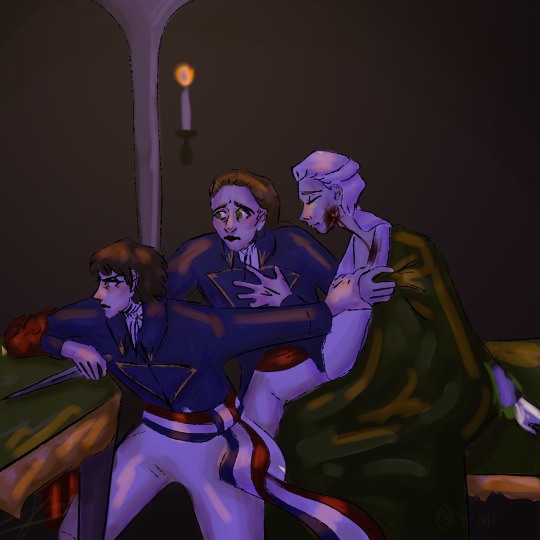
Saint-Just, Le Bas and Robespierre Thermidor sadness once again.
Inspired by the painting “Courage, Anxiety and Despair: Watching the Battle” by James Sant (pictured below)

When I tell you the immense love and admiration I have for this painting, it can not be measured.
#frev#french revolution#claws out for the main 5#claws out for robespierre#robespierre protection squad#maximilien robespierre#robespierre#louis antoine de saint just#saint just#philippe le bas#le bas#frev art#thermidor#courage anxiety and despair: watching the battle
75 notes
·
View notes
Text

I figured I’d share the studio ghibli style x frev progress. Here is a practice sketch I used to get familiar with drawing the style. It’s an imitation of the scene when a young Howl from Howl’s Moving Castle catches the falling star (you know, the part before he eats it?)
Think of it symbolizing not Robespierre eating a literal star, because obviously he would not do that, but rather destiny landing in his hands. That’s corny, I am aware.
There will be more to come, I’m very happy with this one, and I’m very excited.
#frev#french revolution#claws out for the main 5#robespierre#maximilien robespierre#claws out for robespierre#studio ghibli and frev
31 notes
·
View notes
Text
Desmoulins: “you act like you’re better than everyone but you have the brain of a bird.”
Saint-Just: “I’m sorry I’m going to need you to clarify, are we talking about the brain of a crow or the brain of a pigeon?”
Robespierre, offended, from the background in a chair: “hey!”
#frev#french revolution#claws out for the main 5#camille desmoulins#desmoulins#louis antoine saint just#saint just#maximilien robespierre#robespierre#robespierre protection squad#claws out for robespierre#incorrect frev
35 notes
·
View notes
Text
Everyone, quick, tell me frev anecdotes and facts, I’ve been away too long and my memory is foggy ever since I got COVID last summer-
I need a refresher crash course on the main five, how can I have my claws out for them if I can’t even remember their anecdotes.
#I was trying to tell my friends anecdotes and I couldn’t remember them well to save my life#I got so sad#frev#french revolution#claws out for the main 5#robespierre#maximilien robespierre#robespierre protection squad#claws out for robespierre#saint just#louis antoine de saint just#camille desmoulins#desmoulins#georges danton#danton#jean paul marat#Marat#the main five
56 notes
·
View notes
Text
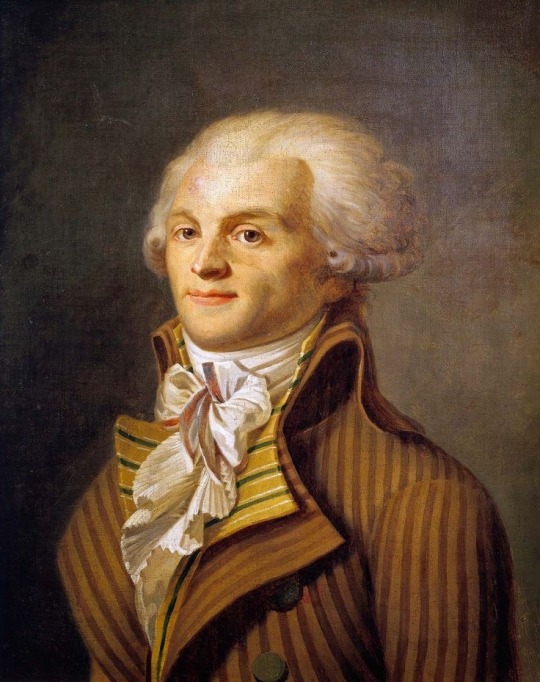
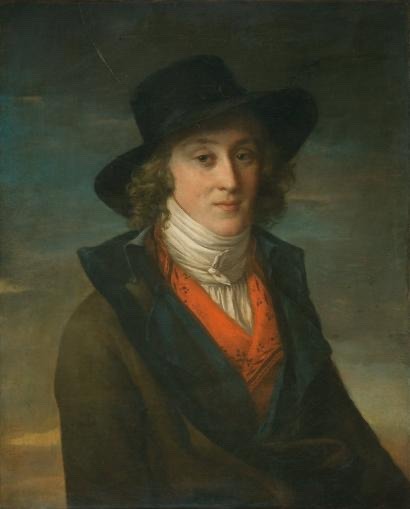
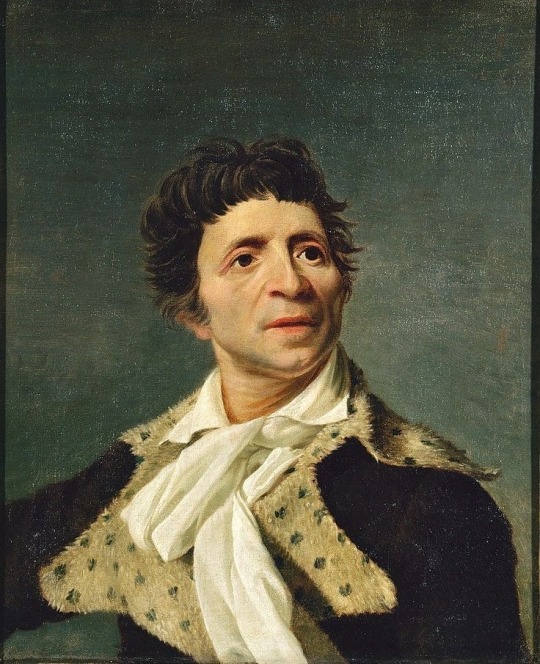
I feel like they’d be happy to see me, a woman, pursuing a higher education, perhaps.
#they just give me that kind of.. idea. For lack of a better term.#frev#french revolution#claws out for the main 5#maximilien robespierre#robespierre#louis antoine saint just#saint just#jean paul marat#marat#robespierre protection squad#claws out for robespierre
37 notes
·
View notes
Text
Idea, everyone.
In case you are unaware, I have a deep love for Studio Ghibli. I also love frev, though that should be quite obvious. You may be wondering where this is actually going.
I dont know if this idea could ever come to fruition, but I would love to see a Studio Ghibli style movie about Robespierre. The beautiful artwork of Hayao Miyazaki and the wonderful music of Joe Hisaishi would be such a wonderful treat if paired with frev. I can see it being a wonderful film, or even short animation.
Just picture it, a young Robespierre and Desmoulins in their schooldays, chatting lightheartedly as the former tends to a pigeon in a park.
Perhaps, years later and well into the revolution, Robespierre and Saint Just, too.
I truly think it would be a beautiful film or animation, if created with the right heart. I would love to see it.

#I’ve been listening to the Spirited Away soundtrack while working on college assignments#it is one of my most favorite Studio Ghibli films.#I can picture it so well. It is in my head I simply do not have all of the means to create it.#frev#french revolution#claws out for the main 5#robespierre#maximilien robespierre#camille desmoulins#desmoulins#georges danton#danton#jean paul marat#marat#louis antoine de saint just#saint just#robespierre protection squad#claws out for robespierre
22 notes
·
View notes
Text
Having been absent from the frev community for a while I seem to have forgotten how wrongly remembered a lot of these individuals are.
Im reminded, now, that Maximilien Robespierre was not a heartless dictator as many would have us believe, who’s sole thought was bloodshed. Instead, he was a shy, quaint individual who had an affinity for oranges and loved his dog and friends. A man who’s dogedness for liberty and willingness to fight tooth and nail for the people and country he loved should be admired.
Im reminded that Saint Just was not a cold, heartless revolutionary, blinded by ambition, but felt emotion, empathy, compassion for those he cared about who describe him as charming, kind, gentle in aspects that relate to the world beyond his work. That he was loyal to those he cared about, almost to a fault. That he most likely had to witness his own friend turn the barrel of a gun on himself and commit suicide during the events of thermidor, as well as seeing Robespierre get shot in the jaw.
Im reminded that they were human. Humans feel. They care. They form bonds and relationships and only those who truly know us can help to portray an accurate version of us when we are gone, especially if we leave few footprints.
#sorry everybody#Im sad over those two again#frev#french revolution#claws out for the main 5#robespierre protection squad#claws out for robespierre#maximilien robespierre#robespierre#louis antoine de saint just#saint just#thermidorian propaganda
48 notes
·
View notes